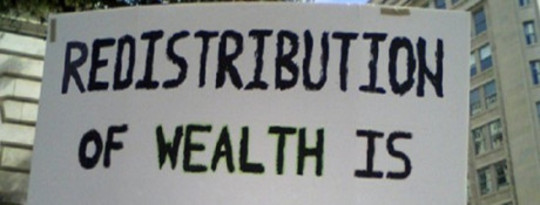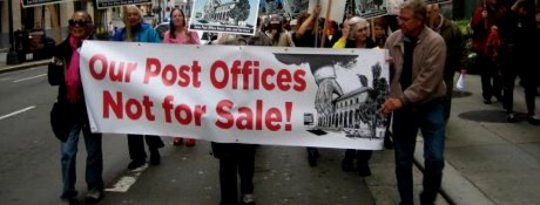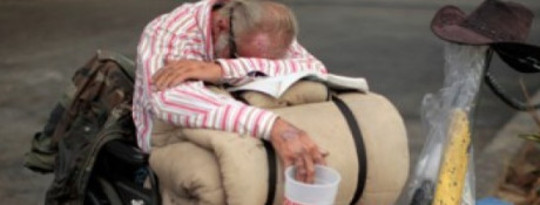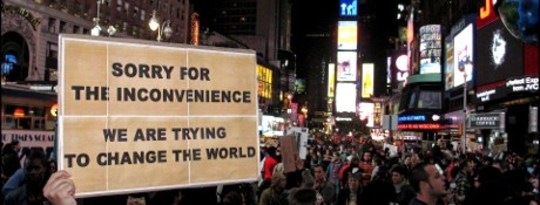- By Robert Reich

One of the worst epithets that can be leveled at a politician these days is to call him a “redistributionist.” Yet 2013 marked one of the biggest redistributions in recent American history. It was a redistribution upward, from average working people to the owners of America.

Though it’s certainly easier to find local, sustainably grown meat and produce in America than it was 20 years ago, the deck nevertheless remains stacked against small farmers and sellers who would feed the steadily increasing demand for such fare. Many of our food-production system’s most dangerous and unsustainable practices...
- By Woody Tasch

In a way, nothing could be simpler. I can still hear Carol Peppe Hewitt saying at a Slow Money national gathering: “It really isn’t complicated. There are local food entrepreneurs who need money and local investors looking for good places to put their money. We just need to connect them.”

As far as Mark Dimondstein is concerned, the members of the Postal Workers are going to be out in the streets even more than they already are. Their causes? Increasing revenues for the Postal Service, stopping its creeping privatization, via Staples stores, by the Postmaster General
- By Robert Reich
America has a serious “We” problem — as in “Why should we pay for them?” The question is popping up all over the place. It underlies the debate over extending unemployment benefits to the long-term unemployed and providing food stamps to the poor.

Your instincts may be telling you otherwise, but the global economy will be strengthening in 2014, according to two major reports released in recent weeks. In an improvement over 2013’s global economic growth of 2.1 percent, we will see a 3 percent rise this year and a bump up to 3.3 percent in 2015...
- By Robert Reich

Why has America forgotten the three most important economic lessons we learned in the thirty years following World War II? Before I answer that question, let me remind you what those lessons...
- By David Morris

Last year, when Maryland lawmakers refused to act on bills to raise the state’s minimum wage to $10, Prince Georges and Montgomery Counties joined the District of Columbia to create the first regional minimum wage compact at $11.50 an hour
- By Robert Reich

America’s savage inequality is the main reason equal opportunity is fading and poverty is growing. Since the “recovery” began, 95% of the gains have gone to the top 1 percent, and median incomes have dropped. This is a continuation of the trend we’ve seen for decades. As a result...
- By Robert Reich

Usually it is better to assume the best of people for it really is difficult to know what is in someone's heart. That said many in the modern Republican "conservative" party show every sign of being either mentally challenged, guilty of projection with increasing regularity, or they are just intentionally deceiving anyone who is listening with a blank mental slaten.

You’ve heard the refrain “we live in the information age.” We have fingertip access to the Internet, providing us with massive amounts of information. There are no longer any excuses for us to say we don’t have the information; it is there, but up to us to act on the information. The above is all true but very incomplete

Wealth of half the world’s population now the same as that of tiny elite. Wealthy elites have co-opted political power to rig the rules of the economic game, undermining democracy and creating a world where the 85 richest people own the wealth of half of the world’s population, worldwide development organization Oxfam warns in a report published today.

Methane leaks in natural gas pipelines have long been a concern with the shale gas and fracking boom in Pennsylvania, Colorado and elsewhere. A new study shows methane leaks are also a hazard in major U.S. cities, posing an explosion risk and a threat to the climate.

As a 2013 study in the American Journal of Public Health indicates, even those who have deep knowledge in this area and work directly with the homeless often have difficulty assessing patterns and needs. Further, the problem’s deep and sometimes hidden causes, the diversity of stories of those affected, and the often-invisible nature of life on the streets complicate attempts to quantify the true size and nature of the homeless population

In 2007 members of the homeless community in Olympia, Wash., erected a tent city in a downtown parking lot to protest the lack of services and support. Predictably, the city government responded with arrests and shutting down the encampment

What must be understood is that mental bandwidth is a limited resource which is used for everything. So what happens if we can make some things, like banking, easier for the poor ?
- By Amy Goodman

Fifty years ago this week, President Lyndon B. Johnson launched his "war on poverty," which led to many of the federal and state initiatives low-income Americans rely on today

Deregulation brings us cramped airplane seats and increased TV ads. The skies and airwaves are commons owned by all of us together. That’s the reason why airlines and broadcasting were once regulated—to protect the public’s interest.

When thinking 40 years into the future, people step out of the current political situation, and our sense of what's possible becomes much more expansive. We are not only able to think bigger—we crave it.
- By Robert Reich

Although it’s still possible to win the lottery (your chance of winning $648 million in the recent Mega Millions sweepstakes was one in 259 million), the biggest lottery of all is what family we’re born into. Our life chances are now determined to an unprecedented degree by the wealth of our parents.

With proper care and respect, Earth can provide a high quality of life for all people in perpetuity. Yet we devastate productive lands and waters for a quick profit, a few temporary jobs, or a one-time resource fix. For a surprisingly long time, we humans have successfully maintained the illusion that we are outside of, superior to, and not subject to the rules of nature...

Progressive organizations commonly focus on protesting and demanding corrective action to lessen the harms and injustices of a failed economic system. Changing the system is far more difficult and takes far more time, but it is what we must ultimately do.
- By Robert Reich

Walmart just reported shrinking sales for a third straight quarter. What’s going on? Explained William S. Simon, the CEO of Walmart, referring to the company’s customers, “their income is going down while food costs are not. Gas and energy prices, while they’re abating, I think they’re still eating up a big piece of the customer’s budget.”














